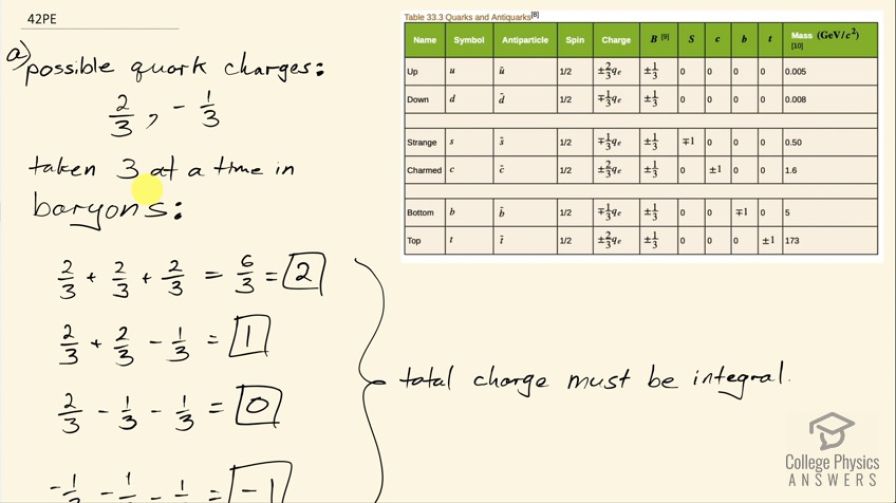Question
(a) Show that all combinations of three quarks produce integral charges. Thus baryons must have integral charge.
(b) Show that all combinations of a quark and an antiquark produce only integral charges. Thus mesons must have integral charge.
Final Answer
Please see the solution video.
Solution video
OpenStax College Physics, Chapter 33, Problem 42 (Problems & Exercises)

vote with a rating of
votes with an average rating of
.
Video Transcript
This is College Physics Answers with Shaun Dychko. We are going to show that all combinations of three quarks produce interval charges and baryons are made up of three quarks. So the possible quark charges are positive two-thirds and negative one-third. If we look at this table of quarks and anti-quarks, every quark in this column here has the corresponding top sign in this charge column and so this is positive two-thirds or negative one-third are the only options among all the different types of quarks. So if we take these two possibilities—three at a time— we could have three of the first possibility so 3 times two-thirds, which is the charge of 2—positive 2— or you could have two quarks that have positive two-thirds and then take a negative one-third for the third quark and this is a total of one for the charge or it could have two-thirds and negative third, negative third for a total of 0 or all three could be negative one-thirds for a total of negative 1 and this means the total charge must be integral. Then when we consider mesons when you have a quark and an anti-quark paired together, the possibilities are positive two-thirds and negative a third for a quark as we mentioned here and then for the anti-quark, the possibilities are negative two-thirds and positive one-third. So if you look at the bottom symbol for each of these rows here, the bottom symbol corresponds to the anti-quark so it's positive a third for a down anti-quark and negative two-thirds for a charm anti-quark for example. And so the mesons will be made up of quark and an anti-quark and so we have to write down the four different combinations that are possible among these two pairs of possibilities. So we could have two-thirds matched with negative two-thirds and that would be a total of 0 or we could have two-thirds matched with positive a third, which will give a total charge of positive 1 or we could have negative a third from the quark and then negative two-thirds from the anti-quark for a total of negative 1 or negative of a third from the quark and positive of a third from the anti-quark for a total of 0 and this also is integral.